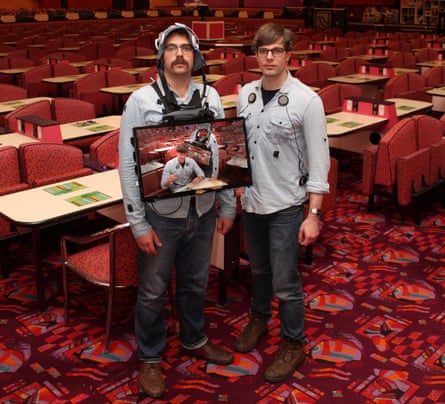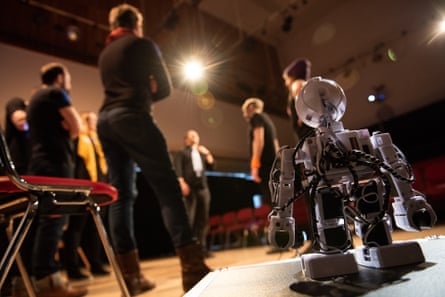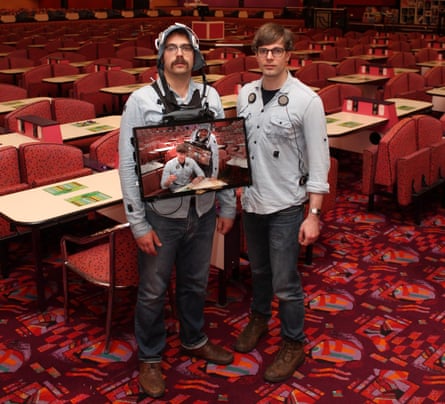A comedy show is probably not the first place to hear about a burning new issue, but standup routines have a habit of swiftly reflecting the worries of our times. This summer’s Edinburgh festival fringe lineup of acts has taken up the threat of artificial intelligence and run with it.
A string of performers at the month-long festival, which begins on 4 August, will either use the technology to generate a show or play with the fears prompted by the rapid surge in its use.
London-based comedian Peter Bazely has confessed to being “out of ideas”, so has turned to AI for help in creating a “relatable” show at the Laughing Horse venue. As a result, he plans to play straight man to a computer-generated comic called AI Jesus – also the name of his show.

Equally unafraid of an algorithm is a show at Gilded Balloon Teviot called Artificial Intelligence Improvisation, hot from the Brighton fringe. Presented by Improbotics theatre lab co-founder Piotr Mirowski, a research scientist on Google’s DeepMind project, the show features both actors and bots responding to audience prompts as chatbots compete with humans to the best punchline.
Behind the theatrics lies a serious purpose, according to Mirowski. The future security of any performer who relies on their imagination rests on the public’s appetite for quality, he argues. “We do not use humans to showcase AI; instead we use AI, demonstrating its obvious limitations, to showcase human creativity, ingenuity and support on the stage,” he clarified this weekend.
Australian comic Tom Ballard has also set his mind to the potential pitfalls of AI dependency by including a joke written by ChatGPT in his show Tom Ballard: It is I. While among those more technologically qualified standups to tackle the topic will be Colleen Lavin, who is billed as a “professional hardware geek” and has worked at Nasa. Looking for support for her debut show at Edinburgh, she claims to have built a robot who can work out whether she is funny. “Come to laugh,” she invites comedy fans, and “stay to impress future robot overlords”.

Robots will feature elsewhere, too. The American comedian Stephen Brower has used coding to perfect the prototype of what he suspects will make the most acceptable sort of gay man for his new show, Palatable Gay Robot. Described as an “edgy amalgamation of standup and theatre”, his show, Brower says, will “take the technological world by storm”.
Over at the Pleasance Courtyard, the ideal robot woman will be giving him a run for his money in the form of the Los Angeles-based clown Courtney Pauroso, back at the festival this time as “sex robot” Vanessa 5000, an entity undergoing a crisis about its own existence. The sales slogan for Pauroso’s show reads “Artificially intelligent. Genuinely stupid. ChatGPT ain’t got nothing on Vanessa 5000’s sweet synthetic ass”.
As comedy critic Veronica Lee, co-founder of the cultural website TheArtsDesk.com, points out, at every Fringe festival a “buzz subject” emerges from hundreds of disparate acts. “Well, at least it’s not rape ‘jokes’ this year,” she said. “Last year, it was comics with ADHD; the best joke I heard was from Colin Hoult’s alter ego, failed actress Anna Mann, who said she had just been diagnosed, adding, ‘but then so has every other fucker at the fringe’.”
Critics, Lee points out, talk of carrying a notional “bingo card” in their head, ticking off those subjects that crop up repeatedly in acts each year.
after newsletter promotion
And, talking of bingo, Foxdog Studios at the Underbelly on Cowgate will use the game as the basis for a new, technologically inspired show, Robo Bingo. Performers Lloyd Henning and Pete Sutton are television consultants with a history of working with interactive technology, and plan to ask their audience to control the antics on stage with their phones.
Edinburgh, it turns out, is the right place for this flowering of AI-inspired fun. Sixty years ago, Donald Michie, the renowned University of Edinburgh professor, set up a small group to research into artificial intelligence in a flat on Hope Park Square.
A 1968 document sets out how the professor predicted AI would alter the future: “Along with question-answering services, which will allow us to inquire about the restaurants in our locality or politics in Paraguay, will come the games opponent, the puzzle setter and the quiz master,” he wrote prophetically.
Michie’s work drew scientific stars to the city, making it the birthplace of major breakthroughs and innovative businesses. “Edinburgh is the home of artificial intelligence in Europe and has constantly led from those early days,” Drew Hemment, professor in data arts and society at the same university, has said.
Join the exciting world of cryptocurrency trading with ByBit! As a new trader, you can benefit from a $10 bonus and up to $1,000 in rewards when you register using our referral link. With ByBit’s user-friendly platform and advanced trading tools, you can take advantage of cryptocurrency volatility and potentially make significant profits. Don’t miss this opportunity – sign up now and start trading!







Recent Comments